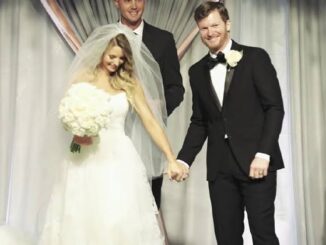Parker Retzlaff experienced a pivotal moment in his burgeoning NASCAR career this past Saturday when he secured a seventh-place finish in the Coke Zero Sugar 400 at Daytona. This race, however, became a hot topic not just for his impressive placement but also for a crucial decision he made on the final lap. Retzlaff, driving the No. 62 Chevrolet for Beard Motorsports—an outfit closely linked with Richard Childress Racing (RCR)—decided to push Harrison Burton to the front rather than aiding his own teammate, Kyle Busch, in the race’s concluding moments. This choice drew significant attention given Retzlaff’s nascent career and his association with RCR.
Dale Earnhardt Jr., in a recent episode of “The Dale Jr. Download,” addressed the controversy surrounding Retzlaff’s decision. Earnhardt asserted that Retzlaff’s options were limited by the position he was in during the race. According to Earnhardt, Retzlaff did the best he could with the circumstances he faced, emphasizing that the directives given to him were clear. He believes that even if Retzlaff had tried to act differently, the outcome likely would not have changed.
In response to the fallout, Retzlaff spoke on SiriusXM NASCAR Radio, choosing to stay away from discussing potential repercussions of his actions. At just 21 years old, Retzlaff expressed that while he was not keen on pushing a Ford over a Chevrolet, he prioritized securing a strong result for FunkAway, his sponsor. With FunkAway’s support being instrumental in his NASCAR journey, Retzlaff aimed to deliver a notable performance despite the complicated situation.
Retzlaff also reflected on the unexpected reaction from fans and the automotive community, clarifying that his intention was never to undermine his teammates or sponsors. He acknowledged that the end of the race did not align with his ideal outcome but highlighted his commitment to honoring his sponsors’ support. Retzlaff’s decision was a balancing act between personal and professional interests.
Earnhardt further illustrated the nature of such controversial decisions by recalling his own experience at Martinsville in 2014. He shared how even with his victory, he faced criticism for not helping a fellow driver, Jeff Gordon, which some fans believed would have benefited Gordon’s playoff chances. Earnhardt’s comparison underscores the complex nature of racing decisions and the inevitable scrutiny drivers face, regardless of their choices on the track.



Be the first to comment